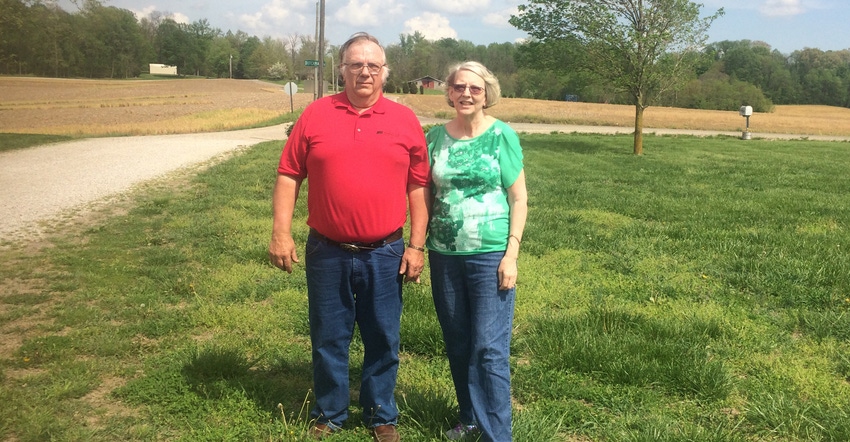
Bill Field pulled a rope off the table while talking about grain bin safety to the Posey County Farm Bureau. The Purdue University Extension safety specialist asked the audience why the rope was valuable in a grain bin entrapment incident. Most people weren't ready for the answer.
“It’s how rescuers find the body under the pile of grain,” he said. Some people tie a rope to the ladder on the side of the bin, wrap it around them and think they’re safe, he explained. If you get sucked into flowing grain, Field says the force will rip that ladder section loose, and the rope will go flying. It won’t save you.
If Field didn’t have everyone’s attention before, he did then. He was at the meeting to discuss the preview of a video, “Stop, Think and Live,” produced by the Posey County Farm Bureau. It’s based on the re-enactment of an actual incident that happened to Jim Droege, a Posey County Farm Bureau leader, on March 28, 2016.
Here is a recap of what the incident meant to Droege, based on an exclusive interview with Indiana Prairie Farmer.
IPF: Can you briefly describe what happened?
Droege: We were emptying a bin of corn and grain stopped flowing. I went inside the bin to check it out, and my brother, Paul, stayed outside by the unloading auger. I didn’t think there was that much corn left in the bin. I stood to one side of the outlet well and poked at the pile with a rod. Grain started flowing again.
IPF: Then what happened?
Droege: Before I knew it, I was trapped in the grain. Once it gets above your knees, you can’t move. It all happened so fast. I began sinking, and it was soon up to my chest. I threw corn at the wall and yelled. Fortunately, Paul heard me and shut off the auger.
IPF: What was the outcome?
Droege: Paul came in and started shoveling corn to free me. It was a waste of time. More corn ran back in. Finally we called for help. Two township fire departments arrived and used a rescue tube to get me out of the grain.
Ironically, I was one of the people involved in getting Posey County Farm Bureau and the local co-op to buy rescue tubes and provide training on grain bin rescues a year before. I never dreamed I would be the first one to benefit from it.
IPF: What were your thoughts once you were free?
Droege: I thought I would just climb up the ladder, and that would be the end of it. Instead, they put me on a backboard and lifted me out with a ladder truck. As I cleared the door on the backboard, I saw how many cars, trucks and other rescue vehicles that were on the scene. Maybe that’s when I realized it was a big deal, and I was lucky to survive.
IPF: What did you learn from the ordeal?
Droege: If I had stopped to think before I went after the plug with a rod with the auger running, this might have never happened. Too many times we don’t stop to think. We just focus on the job we need to do and don’t think about anything else.
IPF: Your wife, Carol Jo, delivers some powerful statements in the video. Do you agree with her?
Droege: Absolutely. She recounted everyone that would have been impacted if this had turned out differently and I could no longer work, or worse. The farm would have been impacted, my brother, of course, my wife and my kids. It came home to me when Carol Jo told me she called our daughter in Chicago, and she began screaming over the phone. “Doesn’t he know he’s about ready to retire? Doesn’t he want to see his new grandchild that’s on the way?”
IPF: No one thinks about those things, do they?
Droege: No, at least I didn’t before. That’s why we named the video “Stop, Think and Live,” and repeated it many times throughout. There are other people and consequences riding on your actions, not just your well-being.
IPF: Why did you agree to help with the reenactment for the video?
Droege: If telling this story in this somewhat powerful way saves just one person, then it was worth it. We may never know whether it does or not, but we know we tried.
IPF: How can someone get a copy of the video?
Droege: Email me at [email protected]. The Posey County Farm Bureau distributed flash drives to every Farm Bureau office in Indiana, and Purdue is distributing them to ag departments and Extension offices. We can send anyone a copy for a small charge to help cover our costs. This isn’t about making money; it’s about urging people to stop and think, and save lives.
About the Author(s)
You May Also Like




